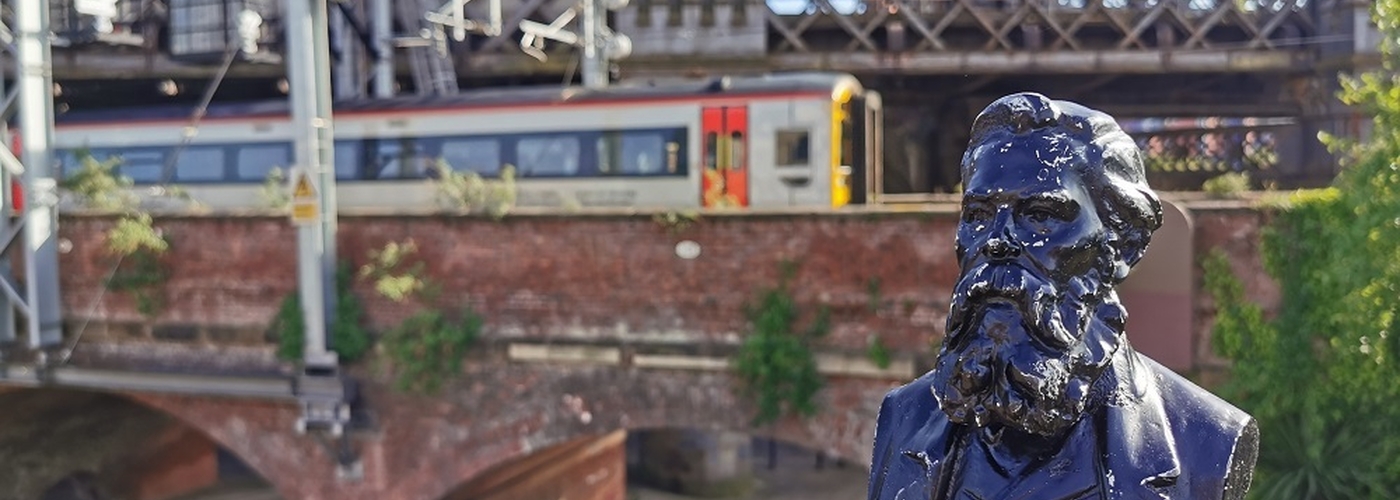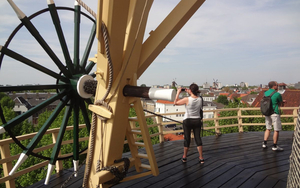Ahead of Engels' birthday tour Jonathan Schofield explores sites associated with the celebrated Communist
Friedrich Engels' long years in Manchester will be celebrated with a tour on Sunday 27 November at 3pm. This is the day before his two hundred and second birthday.
So what sort of man was this co-author of Communism when he arrived in the city in 1842? Every account describes him as as a feisty, curious, "laughter-loving" and brilliant. He was in a sort of exile from his native Germany, his father having called him the 'scabby sheep of the family’ because of his progressive political views. Manchester was chosen because the family, textile manufacturers from Wuppertal in North Rhine-Westphalia, had a factory in Weaste, Eccles, jointly owned by a Dutch businessman called Ermen.
His father thought in Manchester Engels would be removed from the corrupting influence of his fellow radicals. In truth, he couldn’t have chosen a worse place on the planet for young Friedrich. Manchester summed up all the contradictions of progress and conflict in the early-industrial age. There was nowhere quite like it for a man of his leanings.
If Engels had lived not in Manchester, his conception of ‘class’, and his theories of the role of class in history, might have been very different
As Asa Briggs wrote in his brilliant book, Victorian Cities: "All roads led to Manchester in the 1840s. Since it was the shock city of the age it was difficult to be neutral about it. If Engels had lived not in Manchester, his conception of ‘class’, and his theories of the role of class in history, might have been very different. In this case Marx might not have been a communist but a currency reformer. The fact Manchester was taken to be the symbol of the age in the 1840s was of central political importance in modern world history."
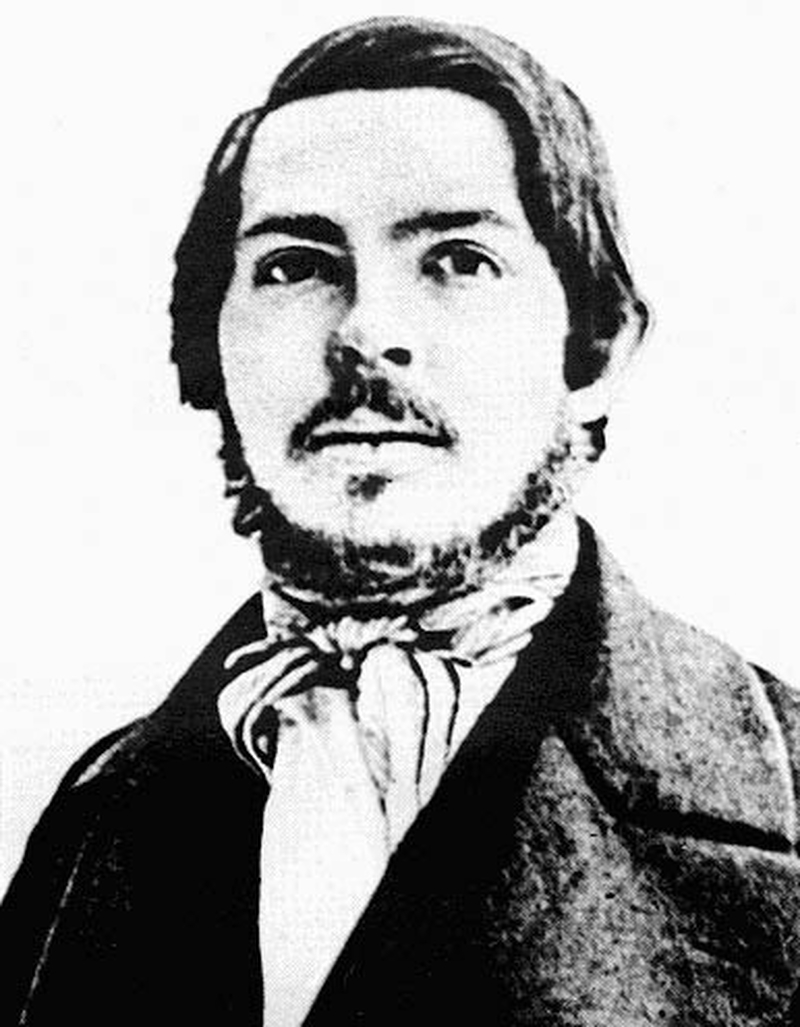
Engels’ experiences led him to write The Condition of the Working Class in England, the seminal record of industrial degradation and the consequences of the unfettered free market in the mid-nineteenth century. He corresponded with Karl Marx at this time and then met him in Paris in 1844. The following year they were both back in Manchester studying at Chetham’s Library. They were writing The Communist Manifesto. Engel’s ideas and words coupled with Marx’s own observations changed the direction of communism.
Engels would live, on and off, in Manchester for 22 years from 1842 to 1869. He made his name while here. His hero status was once so enshrined in Eastern Europe he used to have a statue in every city, albeit, usually a secondary one, next to his old mucker Karl Marx. Then the Berlin Wall fell, and shortly after the Soviet Union disintegrated, and poor old Engels was dragged from his various lofty plinths, smashed to pieces, or placed in storage. A few have survived regime change, such as the statue of the pair in Berlin’s Marx-Engels Forum.
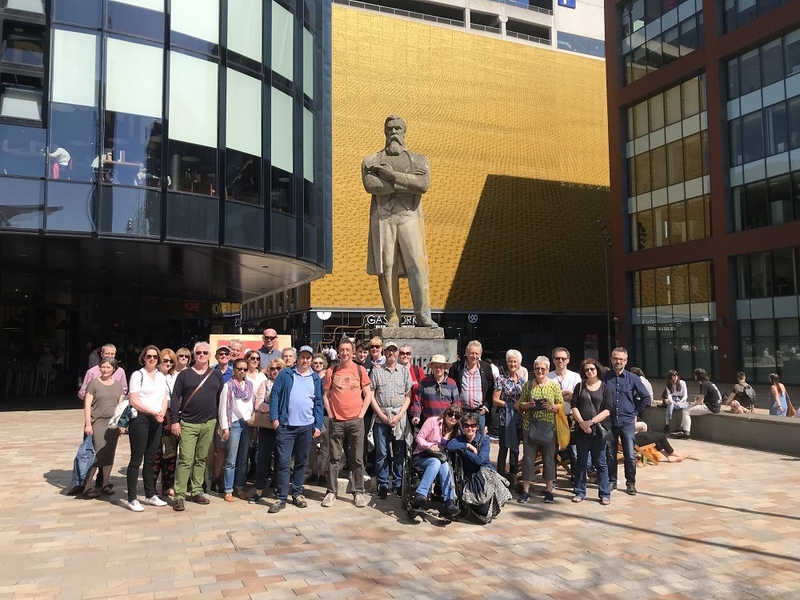
In Manchester a Soviet-era statue of Engels was brought to the city in 2017 by the artist Phil Collins and placed in Tony Wilson Place next to HOME arts centre. This was first erected in the sixties in Ukraine and torn down when that country broke free. There are still traces of yellow and blue on the legs of the hideous work. Bleak Soviet communism was not what Marx and Engels had envisaged when they had dreamed their dreams.
Happily there is a far more cheerful and inspiring commemoration from 2016 at the University of Salford. Jai Redman has created a climbing wall that is Engel's bearded head. It's easy to climb and fun to do so. Engels, with his mischevious sense of humour, would no doubt have loved it.
The best place in Manchester to grab some Engels atmosphere is in Chetham’s Library. The desk where Engels and Marx sat and the books they read are known too, and sit on that bay window desk in facsimile form. In some respects, if only one physical memorial had to survive of the famous German’s Manchester life, then this would have always been the most poignant and finest. Chetham’s is a place of astounding charm with buildings of the 1420s and a library of the 1650s. Given Engels’ legacy is all about learning and ideas, then to have his time in Manchester marked by a library is superbly apt. It was the obvious place for Dr Alice Roberts to head to when she was filming a Channel 4 documentary in 2020 about Manchester's radical history. Tourists come from far and wide to view the famous desk.
Many physical memories of Engels’ time in Manchester have been lost. Change has swept across the city wiping out the many houses, workplaces, pubs and clubs he used to live, work or drink within. Still you can visit the significant locations where Engels walked, lived, worked or drank
The corner of King Street West and Southgate Street is occupied by House of Fraser/Kendals drab multi-storey car park. This was site of the Ermen & Engel’s city centre office where Engels worked for years. The office work enabled Engels to send hundreds of thousands of pounds (in modern money) to Marx so the latter could carry on thinking and sighing in the British Library. Engels hated his work here but he felt he had to support his London-based friend.
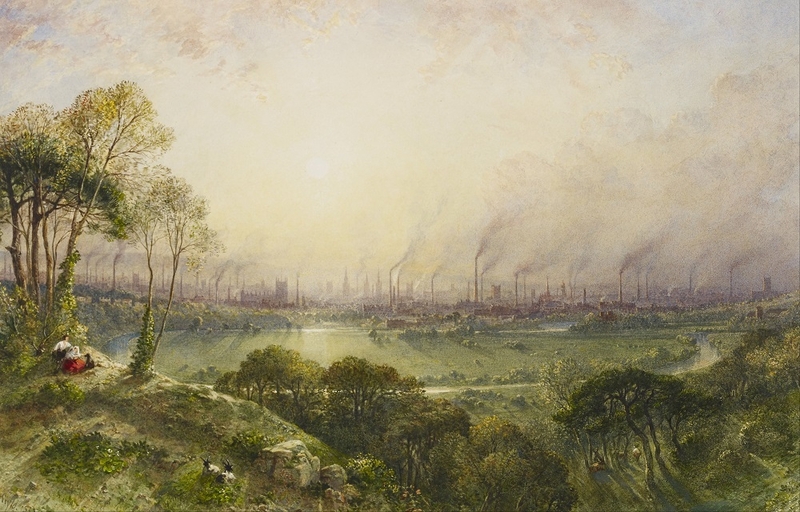
Another place of work was the Royal Exchange which survives but in an altered form to that which Engels would have known. Engels was not a popular visitor to the centre of the global textile trade noting during the 1857 economic crisis how: "I'm continually prophesying a black future and the donkeys become doubly angry." He had a caustic wit, writing to Marx how "the crisis has had a big effect on drinking habits. No one can bear being alone at home with the family and their worries; the clubs have come to life again and the consumption of alcohol has risen steeply. The deeper they sink, the more forcefully they attempt to cheer themselves up. Next morning they are then prime examples of a moral and physical hangover."
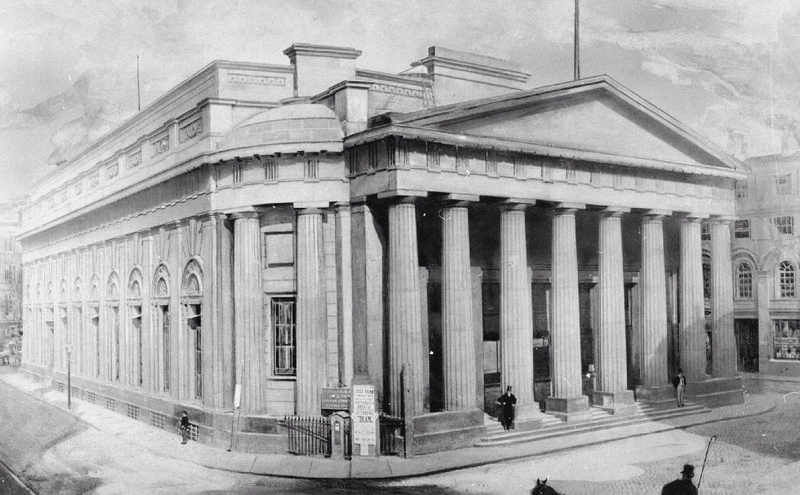
Tracking where Engels lived is difficult. He lived in so many houses in Manchester. There were several reasons for this. He was wary of being traced by the Prussian Secret Service, but also because of the double-life he led; a respectable businessman on one side and author and communist on the other. A further complication was his private life. He lived with common-law wives which was unconvential to say the least in the mid-nineteenth century. His main partner was Mary Burns and both he and Mary had quickly decided that marriage was a bourgeois institution. When Mary died in 1863, her sister who had been living in the same house, Lizzie Burns, became his partner until her death in 1878. He married Lizzie on her deathbed, but by that time he’d been living in London for eight years.
One of Engels' houses, rented in the 1860s, was 51-69 Cecil Street, Moss Side. This was a lovely house in an impressive terrace. Moss Side, at the time, was a very well-to-do suburb and one of the most prosperous in the North, close to the other plush housing areas of Victoria Park and Whalley Range.
There’s no doubting the grandeur of the terrace but its glory days are long gone in the 1973 picture shown above. It’s hard to understand the reasons for the destruction of such fine properties by Manchester City Council: they would be cherished now. The idea was that the city would not need such grand houses in the future and it was better to build more modest houses for a new and less wealthy population, a case of classic short-term planning.
Close to Cecil Street was 6 Thorncliffe Grove, another site of one of Engel’s many houses. There is a blue plaque marking the site, which is now occupied by student accommodation.
Away from houses, there is no trace of the nearby Albert Club and Schiller-Anstalt clubs that this eminently affable, sociable and clubbable man used to frequent, although remains of the Albert Club were excavated in 2013 prior to the construction of the National Graphene Institute which sits on the site on Booth Street East. These were clubs set up by the large German ex-patriot community of the nineteenth century.
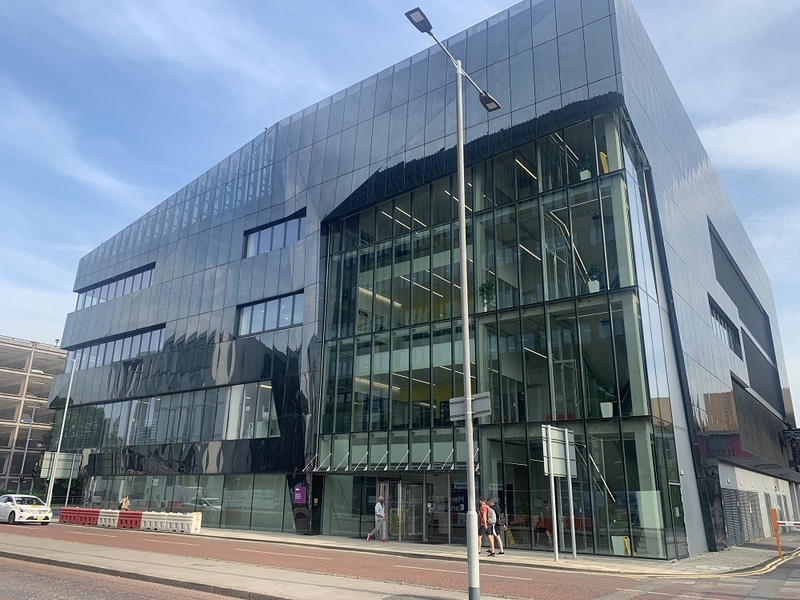
Even Engel’s city centre local pub, The Thatched House, has disappeared. Demolished in 1972, Engels would meet on Saturdays in the boozer, again, with fellow Germans such as the scientists Carl Schorlemmer, Heinrich Caro and Ludwig Mond. This is where he took Karl Marx for drinks during one of his many visits and also where they met British friends. Boots in the Manchester Arndale sits on the site.
The cotton factory of Engels and Ermin has disappeared at Weaste largely when the M602 was built. The mill lodge survives on one side of Liverpool Street and some vestiges of the factory on the other.
The final Manchester house Engels lived in was a large and elegant house on Dover Street not far from the Holy Name Church. The picture on these pages shows it shortly before demolition in 1970, no doubt it would now be the equivalent of the Engels Haus in Wuppertal and a tourist attraction - more short-term thinking from our grandparents it would appear. There’s a lovely account from Karl Marx’s daughter, Eleanor, who was staying at the house, of Engels’ last day at his job on Southgate Street.
‘I was with Engels when he reached the end of his forced labour, and I saw what he must have gone through all those years. I shall never forget the triumph with which he exclaimed: “For the last time!” as he put on his boots to go to the office. A few hours later we were standing at the gate waiting for him. We saw him coming over the little field opposite the house where he lived. He was swinging his stick in the air and singing, his face beaming. Then we set the table for a celebration and drank champagne and were happy.’
Before we leave the trail of Friedrich Engels we should pay a visit to the site of the Hall of Science which stood where St John's Gardens flats stand off Tonman Street, close to the Science and Industry Museum.
On first arriving in Manchester Engels visited and couldn't believe what he was witnessing. "At first one cannot get over one’s surprise at hearing in the Hall of Science the most ordinary workers speaking with a clear understanding on political, religious and social affairs. …I saw the Socialist hall, which holds about 3,000, crowded every Sunday," he wrote. However, he noted with a certain Teutonic disapproval, ‘No matter the seriousness of the topic no Englishman can go longer than three minutes without trying to tell a joke.’
More importantly for history, Engels may have met his working-class girlfriend here, Mary Burns. An English girl of Irish stock she would be his passport through the working class slums of 1840s Manchester, rookeries in which he’d otherwise have been probably beaten and robbed. This led to The Condition of the Working Class in England which in turn led to so much else, for better or worse.
Read next: This City: Tower of Light wins, 18-storey pool and bloody Bridgewater Way cycle lanes
Read again: Germany responds: Jürgen says "thank you" to Manchester
Get the latest news to your inbox
Get the latest food & drink news and exclusive offers by email by signing up to our mailing list. This is one of the ways that Confidentials remains free to our readers and by signing up you help support our high quality, impartial and knowledgable writers. Thank you!






